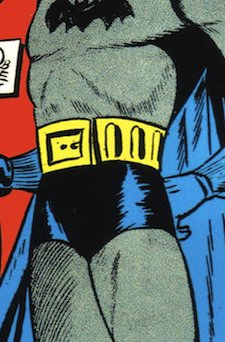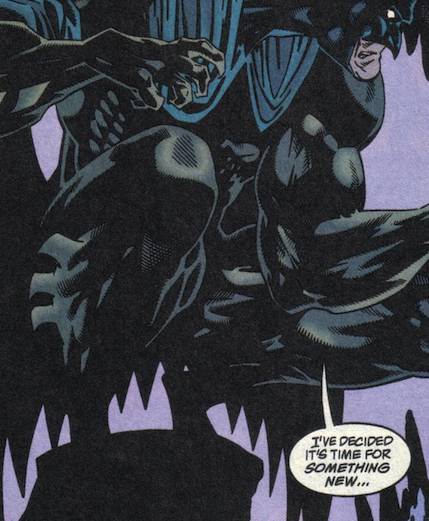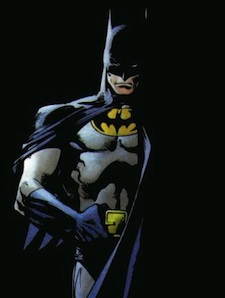Let’s get something straight here: they’re trunks, not underwear. Nobody but losers wear their underwear on the outside—and Batman ain’t no loser, see?
We’ve lost many precious things as a society over the centuries, but perhaps one of the saddest would have to be the racial memory of the origins of superhero costumes. The ability to look at the Caped Crusader’s fighting togs and see nothing but the proud heritage of the circus performer is slipping farther and farther away from us—and we are poorer for it. What was once simply a piece of apparel not too dissimilar to bathing trunks is now ridiculed as “underwear on the outside.” The universe weeps.
When Batman debuted in 1939, the tradition was still in its infancy but he followed the example of no less than the mighty Superman himself: skintight shirt and leggings with boots and cape and, yes, trunks. It was a look that spoke of adventure and thrills, not unlike that you’d receive under the Big Top of a traveling circus, and it would serve countless costumed characters for decades to come. Batman cleverly added a pair of gloves and a mask to the Man of Steel’s fashion sense and he was off to the races…
…and no one batted an eye. It was simply “what one did” among the superhero set.
The Dark Knight’s costume has changed very little over the past seventy years or so and when it has, it’s because some smartass came along and said something along the lines of, “He’s wearing his underwear on the outside!” And then the universe wept again.
One of the first major changes in Batman’s attire came about by accident, presumably. Oh, sure, it took a few issues after his debut in Detective Comics #27 to settle on his gloves (little ones, none, then long ones), but it was about a year later, around the time that Robin appeared, that Batman got the blues… and it wasn’t because of his tight trunks.
 Bob Kane must have been an ink fiend because he chose grey and black for the colors of his creation’s costume, and, working within a medium that demanded that large black areas be broken up with highlights, settled on blue to provide those slight accents. That’s right; Batman was originally beautiful in black, not blue. The blues took over—how?—not sure. Lazy inkers? Could be, but the inside of Batman’s cape was given over largely to blue to break up the black even more and, well, somehow the blue spread and the next thing young readers knew their hero was punching his way through palookas in grey tights and medium blue accent pieces. And no one said a damn thing about his trunks. No one.
Bob Kane must have been an ink fiend because he chose grey and black for the colors of his creation’s costume, and, working within a medium that demanded that large black areas be broken up with highlights, settled on blue to provide those slight accents. That’s right; Batman was originally beautiful in black, not blue. The blues took over—how?—not sure. Lazy inkers? Could be, but the inside of Batman’s cape was given over largely to blue to break up the black even more and, well, somehow the blue spread and the next thing young readers knew their hero was punching his way through palookas in grey tights and medium blue accent pieces. And no one said a damn thing about his trunks. No one.
This costume served him well for years to come. Artists would come and go and add their own peccadilloes to the ensemble but, for the most part, you could recognize the Gotham Guardian every time you opened the magazine. His ears tended to shrink and grow and move around his cowl but, c’mon, did they ever really resemble bat’s ears? Around 1943, shorter ears became all the rage in Batman’s world and by the time artist Dick Sprang hopped onboard (and stayed for years) the short ears that sometimes resembled the petals of a flower were standard equipment. Then, hip, swingin’ artist Neal Adams would take it upon himself to return the ears to their towering status as the 70s dawned and they remain at their upright position to this day. They’ve become “bat-like” in our subconscious, though they, of course, are anything but.
And what about that scalloped cape? Like the ears, it too has expanded and retracted over the years but always retained those unique scoops along its bottom. Adams returned it to its salad days of 1939 when he gave that stretch of material the ability to add matter from nowhere and wrap many times around its wearer. One wonders how, say, the Todd McFarlane Batman of the 1980s was ever able to walk, run or swing with the unimaginable volume of Batcape he was saddled with. Still, I suppose that later artists had it in mind to use the cape to hide those ever more embarrassing trunks from impressionable readers.
Listen, pick up any Batman story from 1939 and up through to the 1990s and you’ll find a fantastic garment that never changes: the Bat-trunks. They did not ride up nor did they slip down; they served their utilitarian function of, presumably, protecting the Bat-bits and no one looked askance at them. Not until, that is, Tim Burton lurched into the (motion) picture.
What got into the ghoulish directors mind back in the late 1980s? His predecessors in the Bat-film department saw nothing wrong with trunks; both Lewis Wilson and Robert Lowery sported perfectly acceptable pants in their 1940s serials, and Adam West’s getup stands as a fine screen adaptation of the 1950s-1960s comic book Bat-costume—albeit silkier and shinier. What crawled up Burton’s butt, then, and died? A pair of trunks, obviously. So, Michael Keaton was spared the horrible, horrible embarrassment of trunks, tights and a two-color palette and gained… black rubber. Movie audiences were also spared the shame, because, after all, the modern mind saw nothing but “underwear on the outside.” The universe sat right down and wept a river.
In the comics, Batman somehow held onto his trunks until 1995’s Batman #515. Remember when the Caped Crusader’s back was broken and then he got better and returned to crimefighting? Yes, well, his fashion sense obviously improved, too. In one scene, Robin and Nightwing look agog as Bruce steps out of the shadows to show off his new look. “Bruce… you… you’re back…” says Robin. “But… your costume…” Batman, drawn by artist Kelly Jones, grimaces like a gargoyle and says, “I’ve decided it’s time for something new…”

The “something new” is—taa daa!—no trunks! And no color! His costume is now all black and sans trunks… and gloves and boots. Yep, a unitard. The key here is that Jones has him in such a crouch in the drawing that you cannot immediately glean the changes, as if they were… embarrassed by them.
Thankfully, I can report here that the trunks, like the cat, came back. But, regrettably, just a few months ago, they went away… again. Yes, we are now in “New Trunk-less Look II” or some such in the Batman comics and the universe is a weeping basket case. Or at least us old school fans are.
See, there’s a lot of junk in those there Bat-trunks, and not all of it is bad.
Jim Beard, among many other stately writing pursuits, is the editor of Gotham City 14 Miles, a new book examining the 1966-68 Batman TV series. Get more info and read a sample chapter from the book, join its official Facebook page, or order a copy.











I’m right there with you. Bat-trunks FTW.
Yeaaaah, I’m not that concerned about it. Trunks are fine in the comics and cartoons, but not in the live action shows. If they went away in print too I wouldn’t be up in arms about it. WWs new costume is way more upsetting, for example. Bat’s is just a small, natural progression of the design.
“Support Your Local Trunks!” That’s our motto!
Well said, Robin…
Jim!
I didn’t think an article about Batman’s trunks would be as good as this! You’re quite right that people forget the original connection between superhero costumes and circus costumes. Whenever I’ve been to the circus, I realize that watching these acrobats in action is the closest I’ll come to seeing superheroes in real life. You’re funny and right about the amazing expanding cape. I’ve read that Bob Kane originally wanted to give Batman a brightly colored costume resembling Flash Gordon’s, and it was Bill Finger who talked him into using the darker colors. Spider-Man’s costume went through a similar evolution, in that, as John Byrne has argued, it originally had black areas with blue highlights, but the black areas turned blue. And I’ve long thought that Batman’s “bat” ears are more like devil’s horns: he’s the “devil” in Gotham’s underworld who’s on our side.
FWLIW, the costume isn’t that far removed from what the early balloon barnstormers used to wear – and that of course also derives from the circus.
I suppose the superheroes got into wearing them because they were also expected to put on a highly acrobatic performance in their deeds of derring-do … it would be hard to perform a la Batman, Superman, or whoever, in a pinstripe with vest and cufflinks …
then we got The Material Girl, and everybody stopped accepting it …
I suppose at that time the circus was a representation of a fantasy world for children, promising exotic thrills and mystery and a bit of danger – everything super heroes promised. With circuses in decline, almost stagnant, I guess the “circus look” just isn’t relevant anymore.
Jim
A British company may have actually inadvertantly came up with a semi plausible reason for the trunks. The company has been making “combat codpieces” for troops going down range interested in protecting their crown jewels.
http://kitup.military.com/2010/12/brits-jock-up-with-armored-skivvies.html#comments
Perhaps the dark knight was simply ahead of his time. I’m not quite sure where that leaves superman though…
Just for the fun of it:
http://en.wikipedia.org/wiki/The_Daring_Young_Man_on_the_Flying_Trapeze
brings you Jules Léotard.
‘Nuff sed?
Lots of junk in those bat-trunks :)
I’m a girl and I like staring at Batman’s butt with or without the trunks.